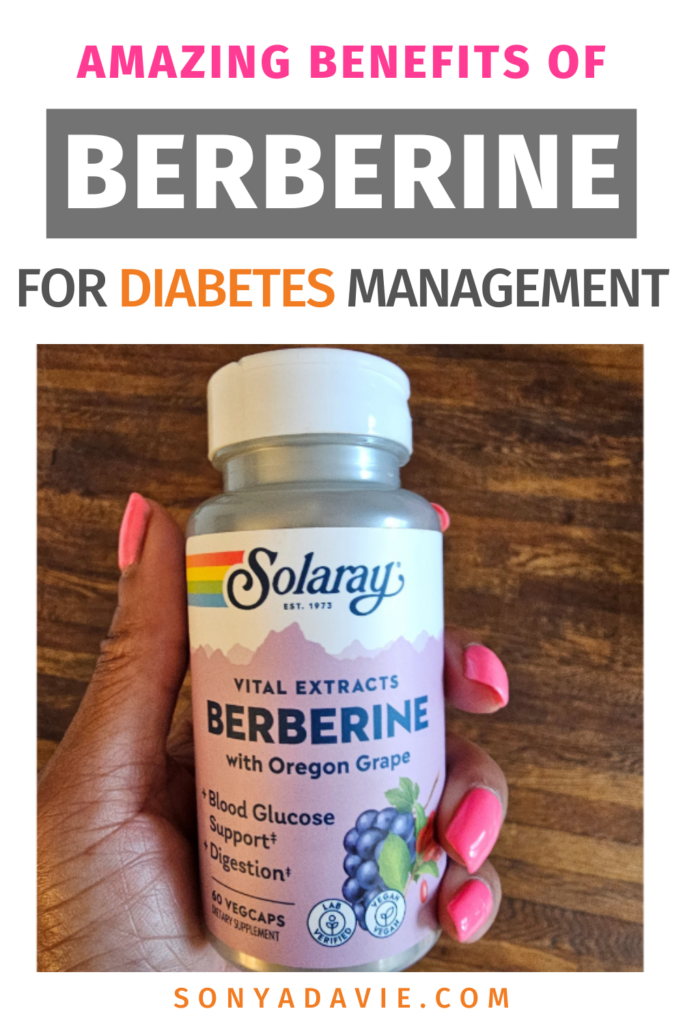Berberine and diabetes have become a hot topic in the wellness and medical communities, with this natural compound showing incredible promise in supporting blood sugar management and overall metabolic health.
As we mark Diabetes Awareness Month this November, let’s explore how Berberine could be a game-changer in your diabetes management plan.
In this blog, I break down the science, benefits, dosage, and how to use Berberine for diabetes management safely.

This post is all about Berberine and diabetes.
What is Berberine?
Berberine is a bioactive compound found in plants like barberry, goldenseal, and tree turmeric. It’s been used for centuries in traditional medicine to address various health concerns, but modern research emphasizes its potential to regulate blood sugar levels and improve metabolic health.
What is Berberine Used For?
While Berberine has a range of health benefits, it’s particularly noted for supporting diabetes management, improving insulin sensitivity, lowering blood sugar levels, and reducing inflammation.
The Science Behind Berberine and Diabetes
Clinical Evidence
For decades, Berberine and diabetes management have been linked through a wealth of scientific research:
- A landmark 2008 study found that berberine lowered HbA1c levels by 7.5%, demonstrating effectiveness comparable to metformin in managing blood sugar.
- A 2012 meta-analysis reported a remarkable 20% reduction in fasting blood sugar levels, along with consistent improvements in post-meal glucose levels, further validating berberine’s metabolic benefits.
- A 2023 article from Nebraska Medicine highlighted Berberine’s ability to reduce blood sugar levels, enhance insulin sensitivity, and improve cholesterol profiles, solidifying its reputation as a powerful supplement for diabetes management.

How Does Berberine Work?
Berberine’s unique mechanisms target multiple aspects of metabolic health.
Here are some of the Key Berberine Benefits for Diabetes:
1. Lowers Blood Sugar Levels
Clinical trials demonstrate that Berberine can reduce fasting blood glucose by 20% and post-meal glucose by 11.1%. These results are comparable to some conventional diabetes medications.
2. Improves Insulin Resistance
By enhancing insulin sensitivity, Berberine helps prevent blood sugar spikes and crashes, offering a steadier energy balance throughout the day.
3. Supports Weight Management
Weight control is a critical part of managing type 2 diabetes. Berberine aids in fat metabolism and supports weight loss, helping individuals achieve and maintain healthier body weights.
4. Improves Lipid Profiles
Berberine can lower bad cholesterol (LDL) and increase good cholesterol (HDL), reducing cardiovascular risks often associated with diabetes.
5. Reduces Inflammation
Chronic inflammation exacerbates diabetes symptoms and metabolic issues. Berberine’s anti-inflammatory properties improve overall health and reduce related complications.
What is the Right Berberine Dosage for Diabetes?
General Guidelines:
- Typical dosage: 500 mg, 2–3 times a day before meals.
- Daily maximum: Most studies recommend no more than 1,500 mg daily.
Why timing matters: Taking Berberine before meals helps reduce post-meal blood sugar spikes.
Important Tip: Always start with a lower dose (e.g., 250 mg) to avoid side effects like mild stomach upset.
How Long Does It Take Berberine to Work?
- Short-term effects: You might notice a decrease in blood sugar within a few weeks.
- Long-term results: Significant improvements in HbA1c and fasting glucose levels are typically observed after 3 months.

Choosing the Best Berberine Supplements
Key Features to Look For:
- High potency: Opt for supplements containing at least 500 mg per capsule.
- Third-party testing: Ensures purity and quality.
- Minimal additives: Avoid products with unnecessary fillers.
Some of the Recommended Brands
- Thorne Research: Known for its high-quality and rigorously tested supplements, Thorne Research offers a potent Berberine formula free of unnecessary additives. Trusted by healthcare professionals, their products are designed to deliver consistent and reliable results.
- Pure Encapsulations: With a focus on hypoallergenic, clinically backed formulations, Pure Encapsulations offers berberine supplements ideal for those with sensitive systems. Every product is crafted to meet the highest standards of purity and efficacy.
Are There Any Potential Side Effects?
While Berberine is generally safe, some people may experience:
- Mild digestive discomfort (e.g., nausea or diarrhea).
- Low blood sugar if combined with diabetes medications.
- Headaches or fatigue in rare cases.
Pro Tip: Always consult a healthcare provider before starting berberine, especially if you’re already on medication for diabetes or other health conditions.
Who Should Consider Berberine?
Berberine may be a good option for:
- Individuals with type 2 diabetes.
- Those with prediabetes looking for preventive measures.
- People seeking a natural alternative to traditional medications.
- Patients struggling with insulin resistance or poor blood sugar control.

Tips for Maximizing Results with Berberine
- Stick to the recommended dosage
Take 500 mg, 2–3 times daily, with meals.
- Adopt a balanced diet
Pair berberine with a low-glycemic diet for optimal blood sugar control.
- Exercise regularly
Physical activity enhances insulin sensitivity.
- Monitor your blood sugar
Regular checks can help track progress.
- Communicate with your doctor
Inform them about any supplements you’re taking.
Final Thoughts:
Should You Try Berberine for Diabetes and Blood Sugar Management?
If you’re managing diabetes, Berberine could be a powerful addition to your treatment plan. Backed by science and natural to boot, it’s worth considering—especially for those seeking alternatives or complements to medication.

However, remember that supplements are just one piece of the puzzle. Combine berberine with a balanced diet, regular exercise, and guidance from your healthcare provider for the best results.
Ready to give it a shot?
Consider trying high-quality Berberine supplements under the guidance of your healthcare provider and see the benefits for yourself.
References
- Metabolism Journal (2008): Research on Berberine and HbA1c Reduction
- Nebraska Medicine (2023):Is berberine a safe alternative treatment for diabetes?
- Medical News Today (2023): The Benefits of Berberine for Diabetes
This post is all about berberine and diabetes.
Related Post:
The Link Between Diabetes and Dementia: What You Need to Know
+ show Comments
- Hide Comments
add a comment